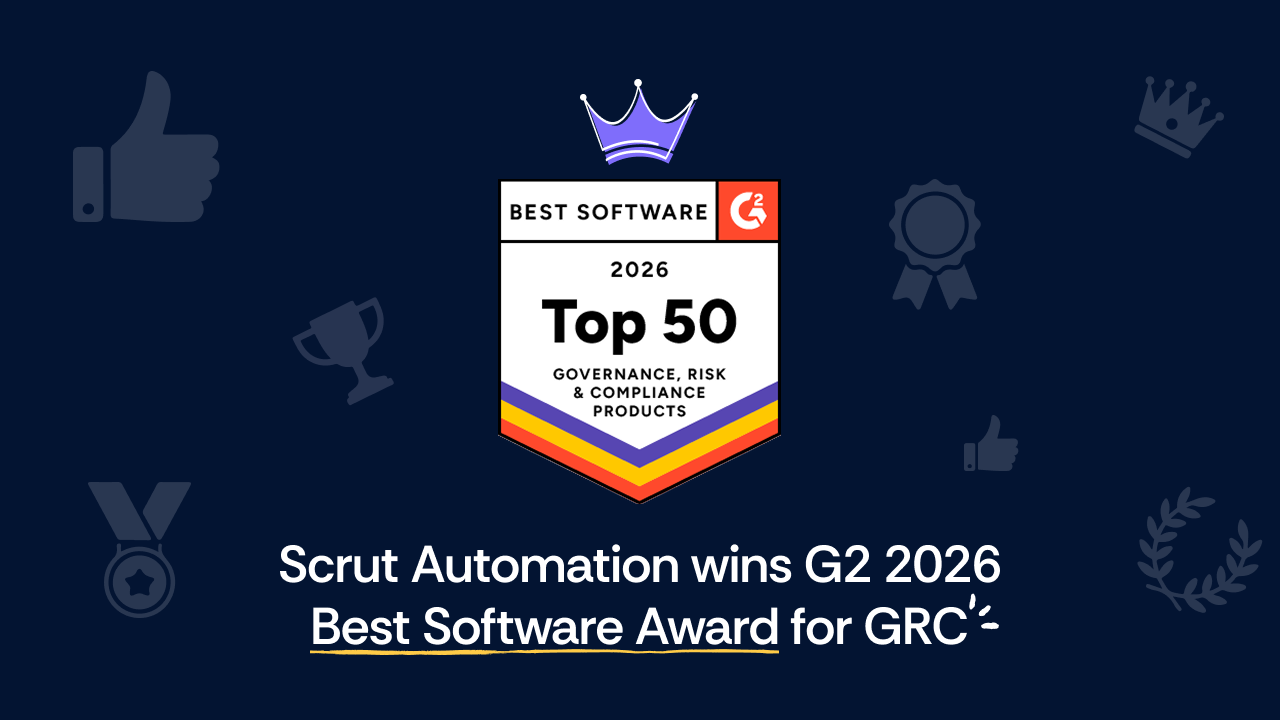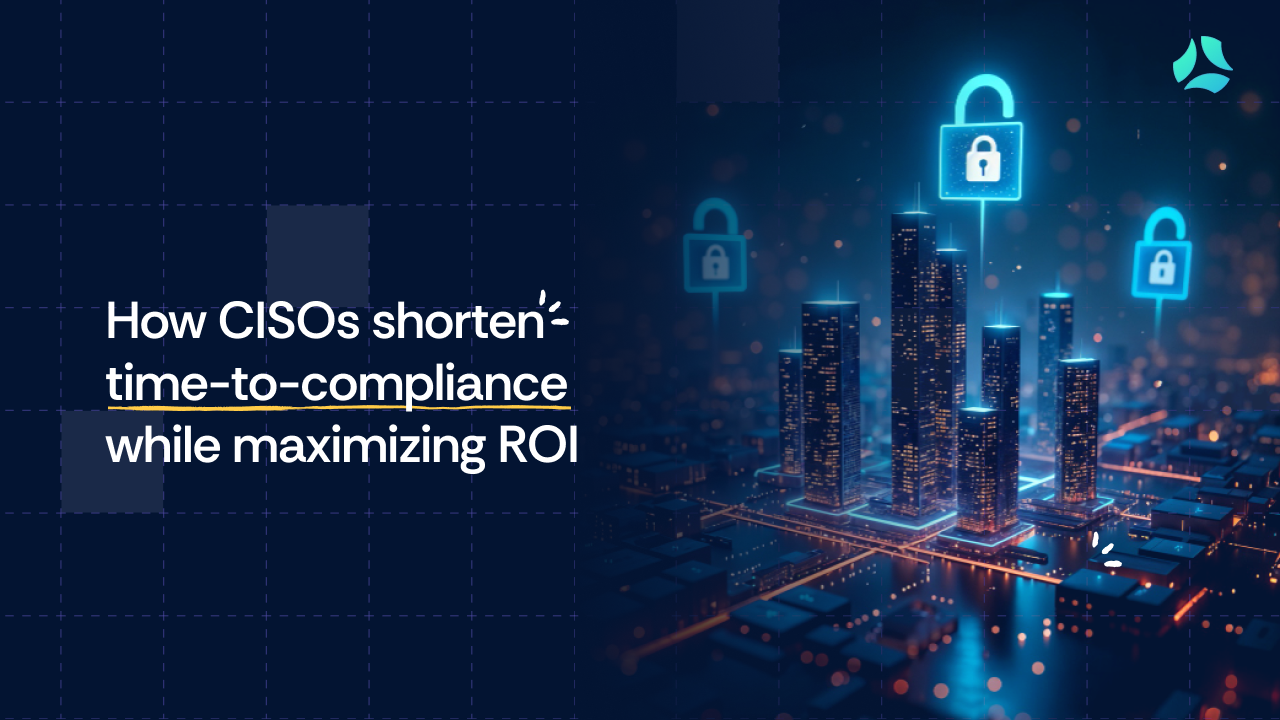Choose risk-first compliance that’s always on, built for you.
Go back to blogs
Understanding ISO 42001: Key Insights and Benefits
Last updated on
May 23, 2025
min. read

Artificial intelligence is transforming industries at an unprecedented pace, but with great power comes great responsibility. As AI adoption grows, so do concerns around ethics, transparency, and regulatory compliance. Organizations must ensure that their AI systems operate responsibly, aligning with evolving global standards.
The International Organization for Standardization (ISO) and the International Electrotechnical Commission (IEC) introduced the ISO/IEC 42001:2023 to address these challenges by providing a structured framework for responsible AI governance. With AI becoming integral to business operations, there was a growing need for a standardized approach to managing AI risks, ensuring accountability, and aligning with international regulations. This standard helps organizations establish clear policies, mitigate risks related to bias and security, and demonstrate compliance with emerging AI laws.
This blog explores ISO 42001’s key principles, certification process, challenges, and how it compares with other AI governance frameworks, such as NIST AI RMF and the EU AI Act.
What is ISO 42001?
ISO/IEC 42001:2023, published in December 2023, is the world’s first Artificial Intelligence Management System (AIMS) standard. It provides a structured framework for organizations to manage AI technologies responsibly, addressing challenges like ethics, transparency, and data privacy. Organizations of any size involved in developing, providing, or using AI-based products or services are responsible for implementing this standard.
Accredited certification bodies conduct certification audits and follow a structured audit process, including documentation review and on-site assessment. The standard itself follows a Plan-Do-Check-Act (PDCA) approach for continuous improvement. The frequency and cost of certification audits vary based on organizational complexity and the specific certification body involved, with an initial certification audit, annual surveillance audits, and a recertification audit every three years.
Why is ISO 42001 crucial in AI management?
ISO 42001 provides a structured framework to manage AI risks, promote accountability, and align with global regulatory expectations. Here’s why this standard is crucial:
1. Establishes AI governance and accountability
ISO 42001 helps organizations create clear policies and procedures for AI governance, ensuring that AI-related decisions are made responsibly and with oversight.
2. Enhances trust and transparency
By following standardized AI management practices, organizations can improve transparency in how AI models operate, helping build trust among customers, regulators, and stakeholders.
3. Supports compliance with AI regulations
With increasing regulations like the EU AI Act and NIST AI RMF, ISO 42001 helps organizations align their AI practices with global compliance requirements, reducing legal and regulatory risks.
4. Mitigates AI-related risks
The standard guides organizations in identifying, assessing, and mitigating risks related to AI ethics, bias, security, and unintended consequences, improving overall AI safety.
5. Encourages continuous improvement
ISO 42001 follows a structured AI management system that promotes ongoing monitoring, auditing, and optimization of AI models, ensuring AI remains effective and responsible over time.
Real-world examples showing the need for AI compliance
The CrowdStrike 2025 Global Threat Report provides clear evidence of how adversaries are exploiting AI to enhance cyber threats. These real-world examples emphasize why strong AI governance frameworks, such as ISO 42001, the EU AI Act, and NIST AI RMF, are critical to mitigating risks and ensuring ethical AI deployment.
1. FAMOUS CHOLLIMA, a North Korea-linked adversary, used AI-generated fake LinkedIn profiles, deepfake videos, and synthetic voices to apply for jobs at global companies under false identities.
2. AI-generated phishing emails now have a 54% click-through rate compared to 12% for human-written messages, making them significantly more dangerous.
3. China-linked adversaries have exploited AI-based cloud environments, attempting to gain access to enterprise AI models and manipulate them for espionage.
4. LLMJacking has emerged as a new attack vector, where threat actors steal access to cloud-based AI models and resell unauthorized usage to criminal groups.
5. GenAI models themselves are becoming targets, with evidence that attackers are exploring vulnerabilities in AI-powered platforms, including prompt injection and model manipulation.
What is the structure of ISO 42001?

ISO 42001 follows a structured framework designed to help organizations manage artificial intelligence (AI) systems responsibly and effectively. It aligns with the Harmonized Structure (HS) used in other ISO management system standards, making it easier to integrate with existing governance frameworks such as ISO 9001 (Quality Management) and ISO/IEC 27001 (Information Security Management). The standard consists of foundational clauses, core requirements, and annexes that provide additional guidance for implementation.
Foundational clauses
Clause 1: Scope
This clause defines the applicability of ISO 42001, stating that it is intended for any organization—regardless of size or industry—that develops, provides, or uses AI-based systems. It establishes the boundaries for implementing an AI management system (AIMS).
Clause 2: Normative references
This section lists essential documents referenced in ISO 42001 that help organizations interpret and apply its requirements. These references align AI governance with established best practices in risk management and compliance.
Clause 3: Terms and definitions
This clause provides definitions of key terms used throughout the standard to ensure consistent interpretation. Standardized terminology helps organizations, auditors, and stakeholders apply the requirements uniformly.
Core clauses
Clause 4: Understanding the organization’s AI landscape
Organizations must analyze internal and external factors that influence their AI systems. This includes regulatory requirements, stakeholder concerns, ethical considerations, and technological advancements that may impact AI governance.
Clause 5: Leadership and accountability
Top management is responsible for establishing AI governance policies, defining roles and responsibilities, and ensuring compliance with ethical and regulatory requirements. This clause highlights leadership’s role in maintaining AI transparency and accountability.
Clause 6: AI risk management and planning
Organizations must implement a structured process to identify, assess, and mitigate AI-related risks while also recognizing opportunities for improvement. This clause emphasizes setting clear objectives and continuously evaluating AI risks.
Clause 7: Resources and operational support
Effective AI governance requires adequate resources, including skilled personnel, technological infrastructure, and proper documentation. This clause ensures that organizations allocate the necessary support to manage AI systems efficiently.
Clause 8: AI system operation and control
Organizations must establish structured processes to manage AI system design, development, deployment, and ongoing monitoring. This ensures that AI models align with ethical standards, business objectives, and compliance requirements.
Clause 9: Performance monitoring and evaluation
Regular assessments, audits, and performance reviews are required to ensure AI systems function as intended. This clause focuses on continuous monitoring and analysis to maintain AI reliability and accountability.
Clause 10: Continuous improvement
Since AI technologies and regulations evolve rapidly, organizations must refine their AI governance practices over time. This clause focuses on learning from past experiences, addressing nonconformities, and making improvements to the AI management system.
Annexes
Annex A: AI control objectives and measures
This section provides a set of control objectives and recommended measures to help organizations manage AI-related risks effectively. It serves as a reference for implementing governance practices.
Annex B: Guidance for implementing controls
Annex B expands on the control objectives from Annex A, offering detailed explanations and best practices to help organizations integrate AI governance into their operations.
Annex C: AI risks and operational considerations
This section outlines key AI risks, such as fairness, bias, security vulnerabilities, and decision-making transparency, and provides guidance on mitigating these risks effectively.
Annex D: Integration with existing management systems
For organizations already following standards like ISO 9001 or ISO/IEC 27001, this annex offers guidance on incorporating AI governance into their existing management systems, ensuring a streamlined approach to compliance.
What is the ISO 42001 certification process?

Achieving ISO 42001 certification demonstrates an organization’s commitment to responsible AI governance. The certification process involves multiple steps, from understanding the standard to obtaining external validation. Using an ISO 42001 checklist can help organizations streamline this process by breaking down requirements into actionable steps.
A well-structured checklist ensures that all aspects of AI governance, risk assessment, and regulatory compliance are addressed effectively. By following a systematic approach, organizations can build a robust AI management system, ensuring transparency, ethical AI use, and compliance with global standards.
1. Understand the ISO 42001 requirements
Start by reviewing ISO 42001 to familiarize yourself with its principles, including AI governance, risk management, and ethical considerations. This step lays the foundation for compliance.
2. Conduct a gap analysis
Assess your organization’s current AI policies and practices against ISO 42001 requirements. Identify gaps in governance, security, and risk management that need to be addressed.
3. Develop and implement an AI management system (AIMS)
Create a structured AI management system that aligns with ISO 42001. This includes defining policies, assigning responsibilities, and implementing controls to mitigate AI-related risks.
4. Train personnel and raise awareness
Ensure that employees and stakeholders understand their roles in AI governance. Provide training on ISO 42001 requirements, ethical AI practices, and risk mitigation strategies.
5. Monitor AI governance processes
Establish mechanisms to track the effectiveness of AI-related policies and controls. Maintain documentation to demonstrate compliance and support continuous improvement.
6. Perform internal audits
Conduct internal audits to evaluate the effectiveness of your AI management system. Identify areas for improvement and address any non-conformities before the external certification audit.
7. Engage an accredited certification body
Select a recognized certification body to perform an external audit. The auditors will review policies, procedures, and AI governance practices to assess compliance with ISO 42001.
8. Address audit findings and finalize certification
If the external audit identifies issues, implement corrective actions to meet certification requirements. Once all compliance criteria are met, the organization receives ISO 42001 certification.
What are the challenges in implementing ISO 42001?

Implementing ISO 42001 presents several challenges, especially for organizations new to AI governance. While the standard provides a structured framework for responsible AI management, aligning existing processes with its requirements can be complex.
Organizations must address regulatory uncertainties, resource constraints, and the evolving nature of AI risks. Below are some of the key challenges businesses face when adopting ISO 42001.
1. Adapting to evolving AI regulations
AI regulations differ across regions, and new laws continue to emerge. Ensuring compliance with ISO 42001 while aligning with various regulatory requirements can be challenging.
2. Integrating AI governance into existing systems
Many organizations already follow ISO standards like ISO 27001 (Information Security) or ISO 9001 (Quality Management). Merging AI governance with these frameworks requires careful planning to avoid operational disruptions.
3. Identifying and mitigating AI risks
AI systems can introduce risks related to bias, transparency, and security. Organizations must develop robust risk assessment processes to effectively identify and mitigate potential AI-related harms.
4. Allocating necessary resources
Implementing ISO 42001 requires financial, technical, and human resources. Smaller organizations may struggle to allocate budget and skilled personnel to meet compliance requirements.
5. Ensuring continuous monitoring and improvement
AI models evolve over time, which means governance frameworks must also adapt. Maintaining an effective AI management system requires ongoing audits, performance reviews, and improvements.
6. Managing stakeholder expectations
AI governance involves multiple stakeholders, including leadership, compliance teams, developers, and customers. Aligning their expectations while implementing ISO 42001 can be a challenge.
Platforms like Scrut streamline AI governance by integrating ISO 42001 with existing frameworks, reducing manual effort, and ensuring continuous monitoring.
How can one ensure ethical and responsible AI framework implementation?
Ensuring ethical and responsible AI framework application requires a proactive approach that prioritizes transparency, fairness, and accountability. Organizations should establish clear AI governance policies, conduct regular risk assessments, and implement bias mitigation techniques to prevent unintended harm.
Embedding ethical considerations into AI development, such as explainability and human oversight, helps maintain trust and regulatory compliance. Continuous monitoring, stakeholder engagement, and alignment with global standards like ISO 42001, NIST AI RMF, and the EU AI Act further strengthen responsible AI practices, ensuring that AI systems operate safely and fairly across diverse applications.
ISO 42001 vs. NIST AI RMF vs. EU AI Act
Scrut: Simplifying AI and cybersecurity compliance for modern enterprises
In an era where AI governance and cybersecurity regulations are rapidly evolving, Scrut helps organizations stay ahead by streamlining compliance with frameworks like ISO 42001, SOC 2, ISO 27001, GDPR, HIPAA, and more. Our AI-driven platform automates compliance workflows, centralizes risk management, and provides real-time visibility into your security posture—so you can focus on growth without the compliance burden.
With Scrut, organizations can seamlessly align with AI management standards like ISO 42001 while integrating with NIST AI RMF, the EU AI Act, and other regulatory frameworks. Whether you’re a fast-scaling startup or an established enterprise, Scrut ensures that your AI and security programs remain audit-ready, risk-resilient, and fully compliant—without the operational complexity.

FAQs
Does ISO 42001 incorporate AI risk management?
Yes. ISO 42001 includes AI risk management as a core component, providing guidelines for identifying, assessing, and mitigating AI-related risks.
How does ISO 42001 impact AI risk management?
ISO 42001 strengthens AI risk management by introducing structured governance, transparency, and accountability measures. It helps organizations proactively assess AI risks and implement controls to ensure ethical and responsible AI deployment.
What other ISO standards help mitigate AI-related risks?
- ISO/IEC 23894 – Focuses on AI risk management principles and guidelines.
- ISO/IEC 38507 – Provides AI governance standards for IT and business leaders.
- ISO/IEC 5338 – Addresses AI trustworthiness and bias mitigation.
- ISO/IEC 42006 – Establishes guidelines for AI system impact assessment.
- ISO/IEC 22989 – Defines AI concepts and terminology for standardization and compliance.
What are some popular ISO 42001 AI compliance software?
Some of the most popular ISO 42001 AI Compliance Software are as follows
- Scrut
- Vanta
- Drata
- A-LIGN
Is this standard applicable to all AI systems?
No. While ISO 42001 is designed for AI governance across industries, its application depends on an organization’s risk profile, regulatory requirements, and AI use cases.
What is an AI Management System?
An AI Management System (AIMS) is a structured framework that organizations implement to ensure the responsible, transparent, and ethical development and deployment of AI technologies.
What are the main benefits of implementing ISO 42001 for AI systems?
- Strengthens AI governance and accountability
- Enhances compliance with AI regulations
- Improves risk management and bias mitigation
- Increases trust and transparency in AI models
- Enables structured monitoring and continuous improvement
Can we use ISO 42001 as an AI readiness assessment?
Yes. ISO 42001 provides a structured approach to evaluating AI governance maturity, helping organizations assess their preparedness for AI compliance and risk management. However, for a comprehensive readiness evaluation, organizations may need to supplement it with additional frameworks like NIST AI RMF.
Is ISO 27001 the same as ISO 42001?
No. While ISO 27001 focuses on information security management, ISO 42001 is dedicated to AI governance and risk management. Learn more: ISO 27001 vs ISO 42001
Table of contents


















